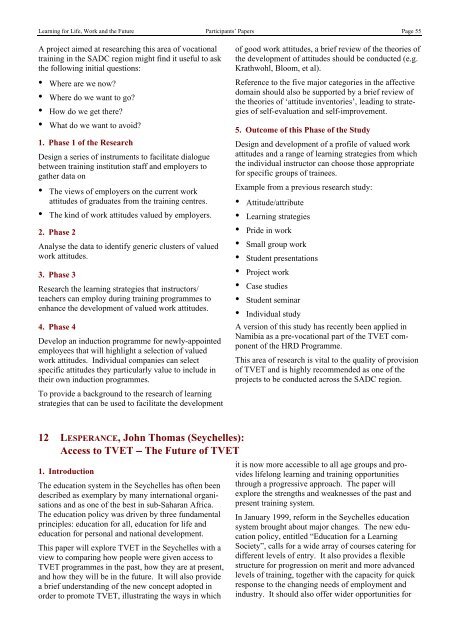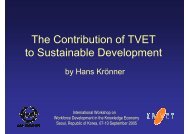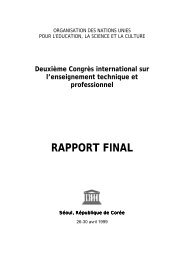Learning for Life, Work and the Future Initial ... - Unesco-Unevoc
Learning for Life, Work and the Future Initial ... - Unesco-Unevoc
Learning for Life, Work and the Future Initial ... - Unesco-Unevoc
You also want an ePaper? Increase the reach of your titles
YUMPU automatically turns print PDFs into web optimized ePapers that Google loves.
<strong>Learning</strong> <strong>for</strong> <strong>Life</strong>, <strong>Work</strong> <strong>and</strong> <strong>the</strong> <strong>Future</strong> Participants’ Papers Page 55<br />
A project aimed at researching this area of vocational<br />
training in <strong>the</strong> SADC region might find it useful to ask<br />
<strong>the</strong> following initial questions:<br />
• Where are we now?<br />
• Where do we want to go?<br />
• How do we get <strong>the</strong>re?<br />
• What do we want to avoid?<br />
1. Phase 1 of <strong>the</strong> Research<br />
Design a series of instruments to facilitate dialogue<br />
between training institution staff <strong>and</strong> employers to<br />
ga<strong>the</strong>r data on<br />
• The views of employers on <strong>the</strong> current work<br />
attitudes of graduates from <strong>the</strong> training centres.<br />
• The kind of work attitudes valued by employers.<br />
2. Phase 2<br />
Analyse <strong>the</strong> data to identify generic clusters of valued<br />
work attitudes.<br />
3. Phase 3<br />
Research <strong>the</strong> learning strategies that instructors/<br />
teachers can employ during training programmes to<br />
enhance <strong>the</strong> development of valued work attitudes.<br />
4. Phase 4<br />
Develop an induction programme <strong>for</strong> newly-appointed<br />
employees that will highlight a selection of valued<br />
work attitudes. Individual companies can select<br />
specific attitudes <strong>the</strong>y particularly value to include in<br />
<strong>the</strong>ir own induction programmes.<br />
To provide a background to <strong>the</strong> research of learning<br />
strategies that can be used to facilitate <strong>the</strong> development<br />
of good work attitudes, a brief review of <strong>the</strong> <strong>the</strong>ories of<br />
<strong>the</strong> development of attitudes should be conducted (e.g.<br />
Krathwohl, Bloom, et al).<br />
Reference to <strong>the</strong> five major categories in <strong>the</strong> affective<br />
domain should also be supported by a brief review of<br />
<strong>the</strong> <strong>the</strong>ories of ‘attitude inventories’, leading to strategies<br />
of self-evaluation <strong>and</strong> self-improvement.<br />
5. Outcome of this Phase of <strong>the</strong> Study<br />
Design <strong>and</strong> development of a profile of valued work<br />
attitudes <strong>and</strong> a range of learning strategies from which<br />
<strong>the</strong> individual instructor can choose those appropriate<br />
<strong>for</strong> specific groups of trainees.<br />
Example from a previous research study:<br />
• Attitude/attribute<br />
• <strong>Learning</strong> strategies<br />
• Pride in work<br />
• Small group work<br />
• Student presentations<br />
• Project work<br />
• Case studies<br />
• Student seminar<br />
• Individual study<br />
A version of this study has recently been applied in<br />
Namibia as a pre-vocational part of <strong>the</strong> TVET component<br />
of <strong>the</strong> HRD Programme.<br />
This area of research is vital to <strong>the</strong> quality of provision<br />
of TVET <strong>and</strong> is highly recommended as one of <strong>the</strong><br />
projects to be conducted across <strong>the</strong> SADC region.<br />
12 LESPERANCE, John Thomas (Seychelles):<br />
Access to TVET − The <strong>Future</strong> of TVET<br />
1. Introduction<br />
The education system in <strong>the</strong> Seychelles has often been<br />
described as exemplary by many international organisations<br />
<strong>and</strong> as one of <strong>the</strong> best in sub-Saharan Africa.<br />
The education policy was driven by three fundamental<br />
principles: education <strong>for</strong> all, education <strong>for</strong> life <strong>and</strong><br />
education <strong>for</strong> personal <strong>and</strong> national development.<br />
This paper will explore TVET in <strong>the</strong> Seychelles with a<br />
view to comparing how people were given access to<br />
TVET programmes in <strong>the</strong> past, how <strong>the</strong>y are at present,<br />
<strong>and</strong> how <strong>the</strong>y will be in <strong>the</strong> future. It will also provide<br />
a brief underst<strong>and</strong>ing of <strong>the</strong> new concept adopted in<br />
order to promote TVET, illustrating <strong>the</strong> ways in which<br />
it is now more accessible to all age groups <strong>and</strong> provides<br />
lifelong learning <strong>and</strong> training opportunities<br />
through a progressive approach. The paper will<br />
explore <strong>the</strong> strengths <strong>and</strong> weaknesses of <strong>the</strong> past <strong>and</strong><br />
present training system.<br />
In January 1999, re<strong>for</strong>m in <strong>the</strong> Seychelles education<br />
system brought about major changes. The new education<br />
policy, entitled “Education <strong>for</strong> a <strong>Learning</strong><br />
Society”, calls <strong>for</strong> a wide array of courses catering <strong>for</strong><br />
different levels of entry. It also provides a flexible<br />
structure <strong>for</strong> progression on merit <strong>and</strong> more advanced<br />
levels of training, toge<strong>the</strong>r with <strong>the</strong> capacity <strong>for</strong> quick<br />
response to <strong>the</strong> changing needs of employment <strong>and</strong><br />
industry. It should also offer wider opportunities <strong>for</strong>





